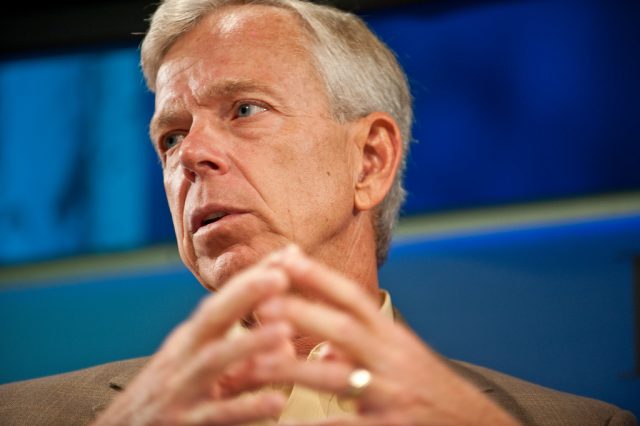
Verizon CEO Lowell McAdam has told Congress that it needs to "retake responsibility for policymaking in the Internet ecosystem" because the Federal Communications Commission's regulatory decisions have reached "absurd new levels."
"[T]he existing legal regime and its accompanying regulatory processes are outdated and broken," McAdam wrote in a letter Friday to leaders of the House and Senate Commerce committees and FCC Chairman Tom Wheeler (courtesy of The Hill). "Congress last established a clear policy framework almost 20 years ago, well before most of today's technology was even developed. As a result, regulators are applying early 20th century tools to highly dynamic 21st century markets and technologies. Inefficiencies and collateral damage are inevitable. It is time for Congress to re-take responsibility for policymaking in the Internet ecosystem."
Verizon is mad about the FCC's decision to reclassify broadband as a common carrier service and impose network neutrality restrictions that prevent Internet providers from blocking or throttling Internet content or prioritizing content in exchange for payment. McAdam's letter also objected to rules that let Dish use discounts intended for small businesses to save $3.3 billion in an auction for wireless spectrum licenses. McAdam said the FCC has repeatedly helped Dish boost its spectrum holdings even though the satellite provider hasn't "announced any plans to use this spectrum to serve customers."
While Wheeler seems open to preventing future bidding similar to Dish's, he is holding firm on the broadband reclassification and net neutrality.
McAdam claimed the net neutrality decision will "spawn years of uncertainty and litigation" and that "the courts inevitably will find that the FCC's actions were improper, or a future FCC will reverse course again." Verizon, which sued the last time the FCC passed net neutrality rules, urged Congress to "pass a bill that protects the open Internet in a way that avoids the collateral damage that will result from the FCC's actions."
Beyond that, it's time to update the Communications Act, McAdam said. The law giving the FCC its power was passed in 1934 and last updated in 1996. That's "too long," McAdam wrote. "In that time, technology and markets have gone through several cycles, while law and policy have stood still," he wrote.
Wheeler bashes Verizon, says new rules will survive court challenge
Wheeler, meanwhile, criticized broadband providers for wanting to operate free of regulation and said that the FCC's net neutrality rules will pass court muster this time.
"We have been told that our rules are too clear and too uncertain, that we are too much fixated on the past and too much focused on the future, that we will protect the profits of incumbent broadband providers and that we will threaten them," Wheeler said Friday in a speech at Ohio State University. "What should we make of these contradictions, this fog of advocacy? We should conclude that the biggest broadband providers in the land have one objective—to operate free from control by their customers and free from oversight from government."
The FCC's actions are "based on fact, not speculation," Wheeler said.
"In 2008, a Republican-led Commission found that Comcast was throttling legal peer-to-peer traffic," he said. "In 2013, when Verizon was asked in open court if it wanted to restrict access through special commercial terms, its counsel replied, 'I’m authorized to state by my client today that but for these rules we would be exploring those commercial arrangements.'”
Verizon Wireless also earned Wheeler's ire with a plan to throttle "unlimited" data customers, a policy Verizon reversed last year after pressure from Wheeler.
"One final prediction: the FCC’s new rules will be upheld by the courts," Wheeler said. "The DC Circuit sent the previous Open Internet Order back to us and basically said, 'You're trying to impose common carrier-like regulation without stepping up and saying, "these are common carriers."' We have addressed that issue, which is the underlying issue in all of the debates we've had so far. That gives me great confidence going forward that we will prevail."
There's one more point of disagreement between Verizon and Wheeler raised in McAdam's letter. Wheeler plans to impose bidding restrictions on the next major spectrum auction to help smaller carriers like T-Mobile and Sprint boost their networks. Wheeler has said this is necessary because AT&T and Verizon control the vast majority of the best spectrum licenses. Naturally, Verizon wants to be able to buy as much spectrum as it can.
The FCC's proposed rules "will intentionally withhold spectrum from the very companies that are investing, creating jobs and serving customers," McAdam wrote. "Congress should ensure that our spectrum policies are aligned with the overall economic interests of the country and are not subject to abuse to serve the interests of particular entities."
McAdam has a friendly audience at Congress, where Republicans want to rein in the FCC. But President Obama and Wheeler share similar views on the broadband classification and net neutrality.
reader comments
152